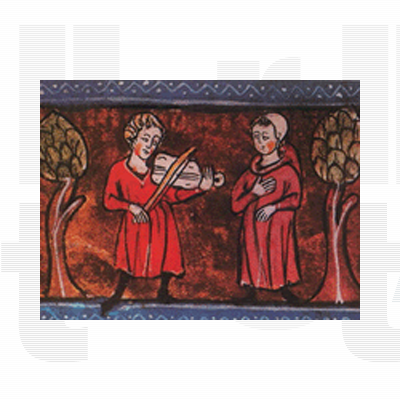Who Were They?
The lyric poets of twelfth- and thirteenth-century Provençal, where natives of southern Gaul mingled with Italians and Catalans, are called troubadours, while their literary art is designated with the Catalan verb trobar, the semantic content of which is comparable with the Latin invenire, which means trobar or "find" (something) and "create literature". The denomination of "poet" was reserved for those who wrote their works in Latin, while that of "troubadour" spread to other languages to designate authors of refined poetry in vernacular language: trouvère in French, trovator in Italian, and trobador in Spanish (later written trovador).
The troubadour not only wrote the poetic text or lyrics but also composed the music by means of which these words were propagated through song. The troubadour was, then, both musician and poet. Medieval song books have conserved a good number of musical notations for poems written by troubadours. This requirement of composing music meant that the troubadour had to be highly trained and competent in a particular specialisation which, in principle, barred the way to mere dilettantes. Neither did the rigid poetic technique permit improvisation.
From the moment the troubadour set out to learn his poetic trade and to live from it, he became a professional of literature. Bernat de Ventadorn, Giraut de Bornelh and Arnaut Daniel lived from the guerdons they received from the different courts they frequented. However, from the earliest days of the art, there were also great lords and kings, sovereign princes and feudal barons who cultivated Provençal poetry and became troubadours, as shown by the earliest among them whose work is still conserved – Guilhem de Peitieu (or William IX, Duke of Aquitaine and Count of Poitiers), Ricard Cor de Lleó (Richard the Lionheart) and Raimbaut d'Aurenga (Count of Orange) – and they were followed by other lords of lower rank in the feudal hierarchy. Just as chivalry was an institution that made all those who professed its ideals brothers-at-arms, Provençal poetry established a certain fraternity among the troubadours, whatever their social class or rank. This is an interesting phenomenon, which would come under the heading of "social" today and which had its echoes in Catalonia when a king like Alfons I engaged in poetic contest with the Limousin troubadour of humble lineage, Giraut de Bornelh, and with Pere Salvatge (although this may be the same person). It should be noted, nevertheless, that Catalonia boasted more troubadours who were feudal lords or vassals of certain rank (Berenguer de Palol, Guerau de Cabrera, Guillem de Berguedà, Ponç de la Guàrdia, Guillem de Cabestany, Huguet de Mataplana, Jofre de Foixà, etc.) than those of humbler origins and exclusively professionals of poetry, which was the case of Cerverí de Girona, also known as Guillem de Cervera. The important point is that the troubadour, for the mere fact of being so, brings together certain literary qualities, thus attaining prestige and a rank that permitted him to occupy a place in the courts, to counsel great lords, act as ambassadors and participate in such endeavours as the crusades in the East.
Martí de Riquer, Antoni Comas, Joaquim Molas. Història de la literatura catalana [History of Catalan Literature] (Barcelona: Ariel).
Courtly Love
This is a literature of men: it is the world as seen by men. This is a male world. Only men count. The only women to appear belong to the family of the hero (mother, sisters, wife and daughters). They weep, swoon... play the role that is expected of the female order. It seems that women did not go to tournaments as often as is believed. When they did go, it was to incite the knights to greater valour: men fight better under their gaze and the war, or mock war, takes on the appearance of a contest among males, becoming one of these exhibitions of "erotic bravado" that come into play in the most elemental of life's mechanisms.
Joan Campàs and Cèsar Carreras. La Vall de Boí's Web Page (Barcelona: UOC, 2002).




